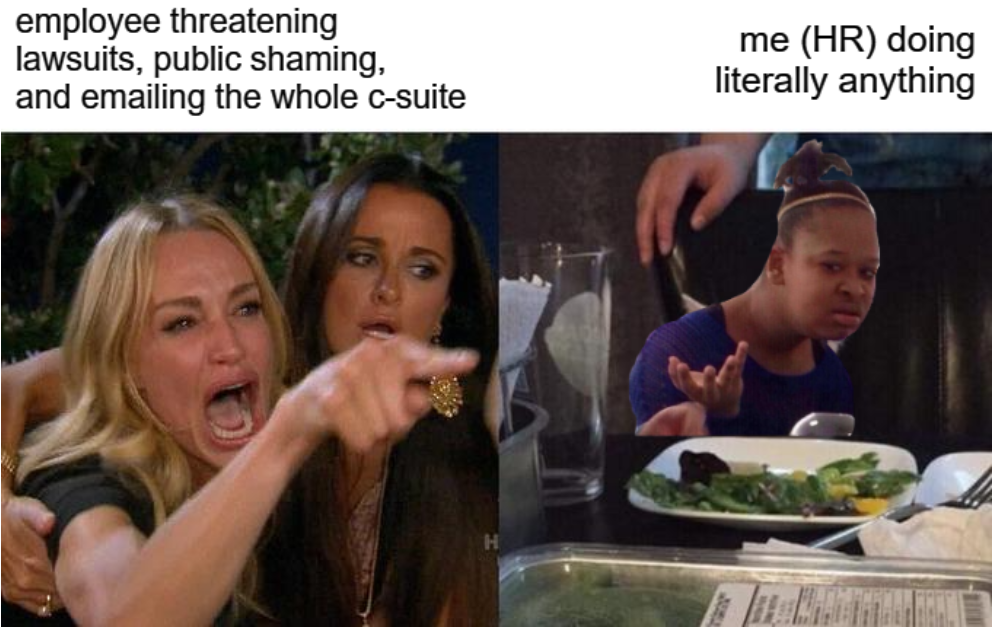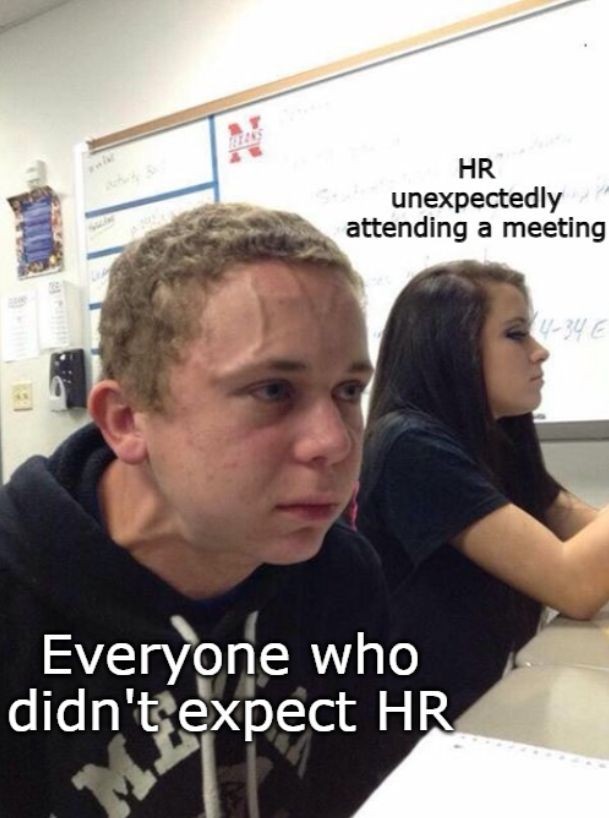Originally written as a LinkedIn article.
Not everyone likes HR.
In fact, most people don’t like HR.
As the group often touting themselves as “employee advocates,” it can be infuriating to repeatedly see them “take the company’s side” by breaking confidentiality or refusing to bend the letter of the law.
“HR is not your friend.”
“HR will always take the company’s side.”
“HR is just there to get you in trouble.”
Or my favorite: “HR is the police.”
Upon hearing this particular phrase “HR is the police” a metaphor came about that I am building this article around. Because it’s true. HR often is the police of a company. But in many more ways than you’re probably thinking.
I’m not using this metaphor to talk about how, like the police, HR is going to turn on sirens and megaphones each time a policy is broken (shout out to my friend Toby Flenderson). Though there is some truth to that stereotype, more abundantly, there is misunderstanding.
Why is HR always throwing a wet towel over my work? Why is HR putting the needs of the company above the needs of me? Why does HR not want to be my friend?” Let’s answer these questions, by first answering why people say the exact same things about the police.
Not everyone likes the police.
Let’s discuss why.
The police never bend to the whims of the individual if it can hurt the community.
Sometimes the police have to tell you “no” to certain things. This does not mean they are an inherently bad organization built off malintent.
Let’s agree that the role of law enforcement extends beyond individual desires and grievances. Police officers are tasked with protecting the community as a whole, even if it means making unpopular decisions.
In the workplace, HR often faces similar challenges. While employees may have individual concerns or grievances, HR’s primary responsibility is to uphold company policies (community laws) to ensure a fair and equitable work environment for all. This may involve making difficult decisions, such as starting an investigation, enforcing disciplinary actions, or terminating employment. While these actions may not always be popular, they are necessary to maintain a productive and harmonious workplace.
The claim that “HR will always take the company’s side” often conjures images of gluttonous corporate executives prioritizing their own interests over those of their employees. However, it’s important to remember that a “company” is simply a group of people, or a community. Therefore, the idea that HR would harm this community is illogical and self-defeating. It interprets the controversial statement “HR only helps the company at the expense of individuals” to “HR only helps the community at the expense of the community.” It’s akin to a house divided against itself. Your vision of greedy corporate executives being in the ear of every HR rep in the company is very incorrect.
From here forward, each time I use the word “company” in this article, please mentally replace it with the word “community”.
Just as the police’s purpose is to serve their community, it is the exact same for HR.
By understanding the broader context of HR’s role, employees can develop a more nuanced perspective and appreciate the value of HR’s services. While it’s natural to feel frustrated or disappointed when faced with adverse decisions, it’s important to remember that HR’s actions are often driven by a desire to protect the people as a whole. Read on to learn more.

The police strictly follow laws that are established to help the community. Making exceptions to the law causes chaos and damages the community.
Just as police officers are bound by laws and regulations, HR professionals must adhere to company policies and procedures. These guidelines are established to ensure fairness, consistency, and legal compliance within the organization. By strictly following these rules, HR can maintain a level playing field for all employees, preventing favoritism and discrimination.
Similar to how police officers enforce traffic laws to prevent accidents, HR enforces company policies to prevent workplace misconduct and disputes. While these rules may sometimes seem restrictive or inconvenient, they are essential for maintaining a safe and productive work environment.
Policies don’t exist just to help HR. By adhering to these guidelines, employees can avoid legal trouble and enjoy a fair and happier workplace.
And no, making exceptions to company policies, no matter how minor it seems, is never okay. This is for all the same reasons a police officer can never excusably allow the law to be broken, no matter how minor.
If HR were to deviate from company policies or make arbitrary decisions, even just a few times, it could lead to legal issues, inequity, and damage to the company’s reputation and success. By maintaining a strict adherence to policies and procedures, HR can ensure that the organization operates ethically and responsibly. Above all, this practice ensures every employee is treated fairly.
Those who don’t like the police are often the ones who are hiding something or who have gotten busted in the past.
People often harbor resentment towards authority figures, particularly those who enforce rules and regulations. This sentiment is especially prevalent when individuals have had negative experiences with law enforcement, such as arrests or citations. These past encounters can create a sense of distrust and hostility, leading to a perception of the police as adversaries rather than protectors.
It is the same in business. Employees may develop negative perceptions of HR due to past experiences with disciplinary actions or policy violations. These negative encounters can lead to feelings of distrust and resentment, as employees may view HR as a punitive force rather than a supportive resource.
These experiences also often lead to venting on social media, with emotional posts claiming that HR is only out to get employees (and such topics are great for social media algorithms). However, it’s important to remember that these are often isolated incidents. Next time you see a viral post about how HR is not your friend, remember that just like you’d take a criminal’s opinion of the police with a grain of salt, you should do the same regarding dramatic opinions of HR.
In the police, there are good eggs and bad eggs.
While the public perception of law enforcement can be skewed by high-profile incidents involving misconduct, it’s important to remember that the vast majority of police officers are truly dedicated public servants. These individuals genuinely care about the safety and well-being of their communities and strive to uphold the law with integrity. Unfortunately, negative experiences with a few bad actors can tarnish the reputation of the entire profession.
Within HR departments, there may be individuals who miscommunicate, misprioritize, or just fail to meet the mark. However, it’s crucial to recognize that most HR professionals are honestly committed to creating positive work environments and supporting employee well-being. These individuals work diligently to resolve conflicts, address concerns, and provide guidance to employees (often behind the curtains). Unfortunately, when it comes to HR, it can often be too easy for intentions to be misinterpreted.
Just as it’s unfair to judge all police officers based on the actions of a few, it’s also unfair to stereotype all HR professionals. HR is not a Disney villain. More often than not, they really want to help you.
Nothing you tell the police is 100% confidential, obviously.
If you go to the police about a crime you’ve committed or are about to commit, the police are obligated to take appropriate action. This may involve sharing information with relevant agencies and stakeholders in order to protect you and other members of the community.
Now, if you go to HR about how you witnessed a coworker getting sexually harassed, of course HR is obligated to take action. If their purpose is truly to look out for and protect each member of the business, they are not going to sit on information no matter how it gets to them.
HR will still keep your matter as confidential as possible. This usually means only telling relevant leaders, legal counsel, and other members of HR in order for the issue to be properly addressed and prevented in the future. HR recognizes that retaliation lawsuits are just as dangerous as discrimination lawsuits, so they’re not going to inform anyone of your sensitive reports unless they absolutely have to know. And if you’d like to know exactly who’s in that group, you are always welcome to ask.
People hate it when the police show up unexpectedly.
An unexpected visit from law enforcement can be unsettling, as it can sometimes signal a serious issue or potential problem. Police officers are frequently called to respond to incidents that involve conflict, distress, or danger. This can lead to a negative association with the police, as they are often seen as harbingers of bad news.
Likewise, everyone gets squirming in their seats when HR unexpectedly shows up to their staff meeting. If HR is the grim reaper just once, then most people can never be comfortable around them. This is unless they understand and remember the true purposes of HR: to help and support.

Just as police administrations strive to understand the community they serve, HR (especially HR Business Partners) aim to understand the teams they support. By engaging with employees, HRBPs can gain valuable insights into team dynamics, challenges, and opportunities. This proactive approach allows them to identify potential issues early on, provide timely support, and implement effective solutions.
So, the next time you see your HRBP, remember that they’re there to help, not hinder. Public executions are rarer than you think.
Police really DO make a positive impact.
Nobody can counter the fact the police overall have a substantial positive impact on our society. They prevent crime, respond to emergencies, and protect lives. They work tirelessly to maintain law and order, ensuring that communities are safe and secure. From apprehending criminals to providing aid to victims, police officers perform a wide range of essential services that benefit society as a whole.
HR is much more behind the scenes, but there is a reason every business in the nation with 100+ employees has some sort of HR function for their workforce. HR is there to hire the people you need, retain the people you have, and overall, empower your workforce to perform the best they can. They help optimize your organization to be more efficient. They keep you from losing tens of thousands in audits and lawsuits. They coach your managers through sensitive performance and interpersonal issues within their team. They provide programs and resources to help your struggling employees improve and excel.
Just because you don’t see all this happening at your organization as easily as when you see HR involved in firing and disciplinary action, only means you need a better vantage point.
Many still perceive HR as a bureaucratic relic of the 1970s. However, modern HR is a strategic function that significantly impacts employee morale and operational efficiency. This evolution has led to HR executives gaining C-suite seats and organizations rebranding HR as “People Operations,” “People and Culture,” or “People Experience.”
If the fed-up workers’ rights influencer was truly correct in saying HR exists only to betray your trust and use your complaints and reports against you, there wouldn’t be an HR function for long (see the “house divided” principle at the beginning of this article). But if HR is actually meant to help organizations and therefore each individual within the organization, it’s very possible they’re making an actual difference. Every business owner understands the importance of an HR function of some sort.
In reality, yes, most police officers DO want to be your friend.
While the public perception of the police is often negative, it’s important to remember that most police officers do genuinely care about the well-being of their communities. They strive to build positive relationships with residents and businesses, and they often go above and beyond the call of duty to help those in need. However, their primary responsibility is to uphold the law and maintain public safety, even if it means making difficult decisions that may not be popular to some people. Because of this, they can’t be friends with everybody.
HR professionals are similarly misunderstood and misrepresented. They’re the opposition, the antagonist, the fiend. But, like the police, even if they may not always be able to fulfill every employee’s desires, their goal is to create a fair and equitable work environment for all. This may involve making tough decisions that impact individual employees, but these decisions are often necessary to protect the interests of the organization as a whole.
It’s important to remember that both police officers and HR professionals are human beings who are trying to do their best in challenging circumstances. And by being human beings, I believe it’s fair to say that they do indeed want to be your friend! It is not a requirement of the job to make enemies, contrary to popular opinion.
This is the challenge we, as HR pros, are faced with every day. It’s that we live in a world where people don’t like us, and people don’t understand us. People think we’re out to get them, to satisfy our own “HR needs,” to save the business money and expend you if necessary.
When in reality, we’re workers with the purpose of serving your community. And that if there’s one thing we hope everyone can understand, it’s this…
The truth is not that we don’t want to be your friend.
The truth, in all simplicity, is that not everybody wants to be our friend.


